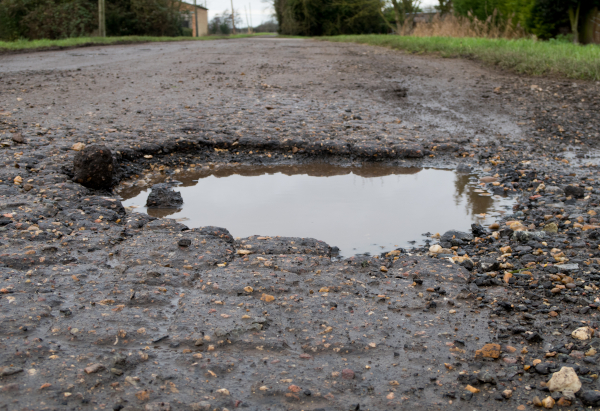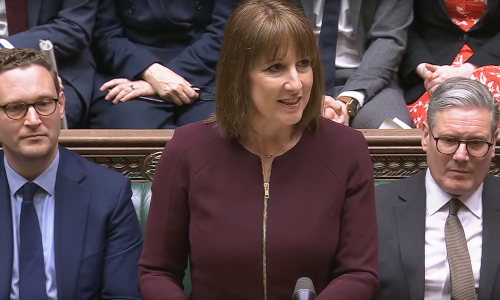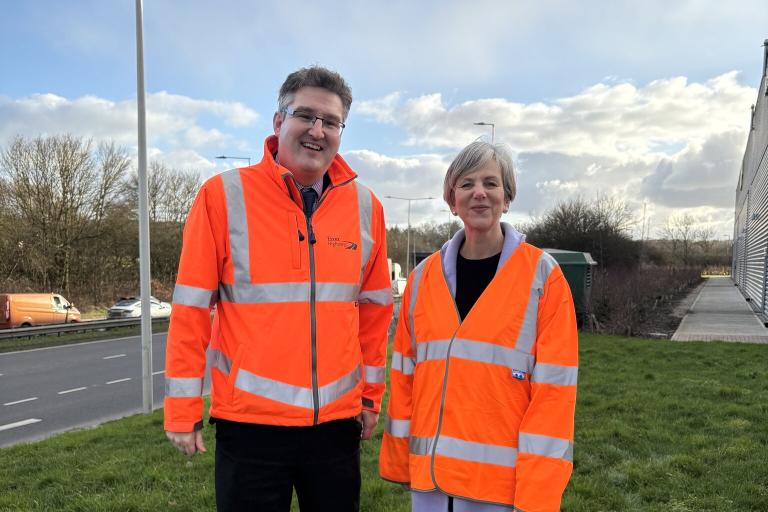The Government's confirmation of an extra £500m for English local road maintenance in the next financial year came with a catch – a quarter of the uplift is held back under an incentive system that has yet to be worked out. Chris Ames looks back to a discussion in Parliament in the autumn to unpick what ministers and officials are thinking.
In the ongoing debate about funding the local road network, there is a hierarchy of issues. Top, of course, is how much money and how long it should last – i.e. the much-hoped for and much-promised long-term funding settlements. But how cash is shared between authorities and what strings are attached are also key concerns.
On the primary issue of how much money, a hearing of the Public Accounts Committee in November seemed to end any lingering hopes of an £8.3bn boost over 11 years from redirected HS2 cash under the previous government's ‘Network North' banner.
Rupert Furness, the Department for Transport's (DfT) deputy director for local highways, described the £8.3bn figure as ‘one that no longer has any traction.' Adding: ‘It's all being reviewed as part of the spending review.'
DfT permanent secretary Dame Bernadette Kelly set out the local maintenance spend for 2025-2026: a base of £1.125bn, on top of which there would be the £150m annual ‘Network North' top-up to this and last year's funding, plus the £500m one-off boost announced in the Budget, to make £1.775bn.
However, in a major announcement just before Christmas, the DfT used a different headline figure – £1.6bn – but this does not appear to include cash bundled within City Region Sustainable Transport Settlements (CRSTS). In the case of established mayoral strategic authorities, this CRSTS money will form part of integrated funding settlements.
Metrics and consequences
In the world of central government funding, unpicking what is additional cash and what would be a normal increase to reflect inflation is a constant challenge.
At present, councils know that overall for 2025-26 they have £650m more than four years ago, but not how much, if any, of that boost will be maintained in settlements for subsequent years.
In terms of the Government's pledge of long-term settlements, Dame Bernadette said her best understanding of the likely timeline was three years beyond 2025-26 but that she understood that the Treasury was interested in looking ‘slightly longer term' for capital allocations.
The last government provided three years of financial certainty from 2022, when it froze funding at the same level (£1.125bn) as the previous year until the end of the Parliament, although it then sporadically added to that figure.
The latest DfT announcement of a planned incentive system gave little detail. We don't know how councils might be tested, only that the department wants to make sure 'authorities spend the money wisely, collect the right data and deliver proactive maintenance before potholes start to form' and that 25% of the £500m uplift would be 'held back until authorities have shown that they are delivering'.
Officials said further details will be shared with local authorities ‘in due course' – Whitehall code for an inability to say when something will actually happen.
Whether central government is getting value for money from its funding for local highway maintenance in England and whether it could achieve more by structuring it in a different way was in fact the main issue under discussion at the PAC hearing, where senior DfT officials gave some clues as to the direction of travel.
The starting point was the National Audit Office (NAO) report in July which slammed the DfT for a lack of knowledge of the condition of the English local road network and what funding for highway authorities is achieving.
In terms of knowing the condition of local roads, DfT officials could at least point to its new standard, PAS2161, whose existence seemed to take the committee by surprise.
Clive Betts MP, a veteran chair of what is currently the Housing, Communities and Local Government Committee, put it bluntly: ‘You need to know what money is being spent on, otherwise what's the point?'
Dave Buttery the DfT's director of roads strategy, replied: ‘Exactly.' He added that if the DfT's data is not good enough, it makes pitching to the Treasury for funds harder.
Dame Bernadette revealed that officials and ministers were currently reflecting about what outcomes they want and the right set of metrics for them. Mr Furness noted the need to make sure that the selection of metrics does not lead to unintended consequences.
Too many pots?
Commenting on the multiple funding streams under which highway authorities receive funding for road maintenance, Mr Betts again offered a blunt assessment: ‘It's a mess isn't it?'
Dame Bernadette replied: ‘I wouldn't argue that it's the most streamlined way to fund local roads. I think certainly we absolutely see the case that at least in relation to national funding which we in DfT provide there are strong arguments for consolidating.'
However, she added: ‘We know that in practice they treat a lot of the pots they receive from DfT as a sort of single resource; once the money reaches the local authority they are not really that bothered…'
Mr Buttery noted that, while the funding reaches councils as un-ringfenced grants, in practice they spend three times as much of their own money.
In fact, a recent briefing from the House of Commons Library notes that local authority road maintenance expenditure in 2022-23 was £4.5bn.
The NAO's own report notes that in the same year the DfT provided local authorities with £1.1bn of capital funding for road maintenance and that authorities spent a total of around £2.1bn of capital, with the additional billion coming from a combination of other government funds and locally derived sources.
The NAO estimated that authorities spent around £580m from revenue funding, drawn from a combination of formula funding from the Department for Levelling Up, Housing & Communities (as it was) and sources such as council tax and retained business rates.
The DfT currently allocates capital funding according to road length and while Dame Bernadette said this could in theory be changed, there would be a new set of winners and losers, for example weighting according to traffic volume would see rural areas lose out. Mr Furness also pointed out that changing the formula on which funding has been provided for many years would have the negative effect of undermining the long-term certainty that the sector is seeking.
The right behaviours
Until recently, the previous self-assessment process provided incentives in the funding structure, although the DfT's view is that it has run out of steam, having served its purpose of promoting an asset management approach. After all, almost all authorities now pass the self-assessment with flying colours, so at the very least new questions are needed.
Dame Bernadette observed that, as well as incentivising councils, the DfT can encourage the right behaviours though means like the Code of Practice, which it is considering revising.
How does all this look to highway authorities? While they are clearly happy to see a large funding boost for 2025-26, they cannot be sure how much of this will survive into the long-term settlements that the government promised would be announced the spring spending review next year. So there is still an air of uncertainty hanging over the sector.
The Local Government Association transport spokesperson Cllr Adam Hug said: ‘Fully funding councils will enable them to far more effectively plan for and invest in preventative treatments which keep surfaces in better condition for longer and prevent potholes, which are more expensive to repair.'
The Asphalt Industry Alliance, which publishes the annual ALARM survey, welcomed the cash injection but said it will do little to help local authorities plan for the long-term rather than just repeatedly filling in potholes.
Chair David Giles said the cash amounts to a fraction of what's needed to prevent further decline and called for clarity on how the money held back will be released.
He added: ‘Our wish for the New Year is that this is a precursor to a multi-year ringfenced commitment from the Government to local roads. This will help to ensure better value for money for the public funds allocated and help to ensure we have a local road network that is safe, keeps people connected and supports economic growth.'
There's a positive note to start the year on.
































